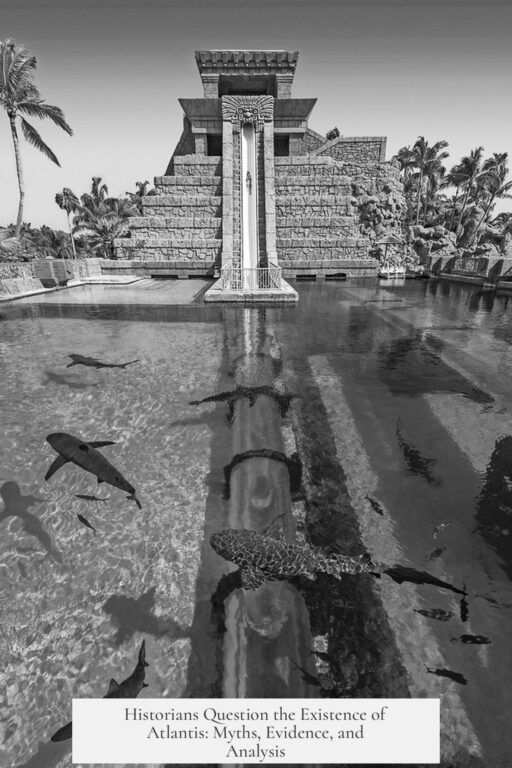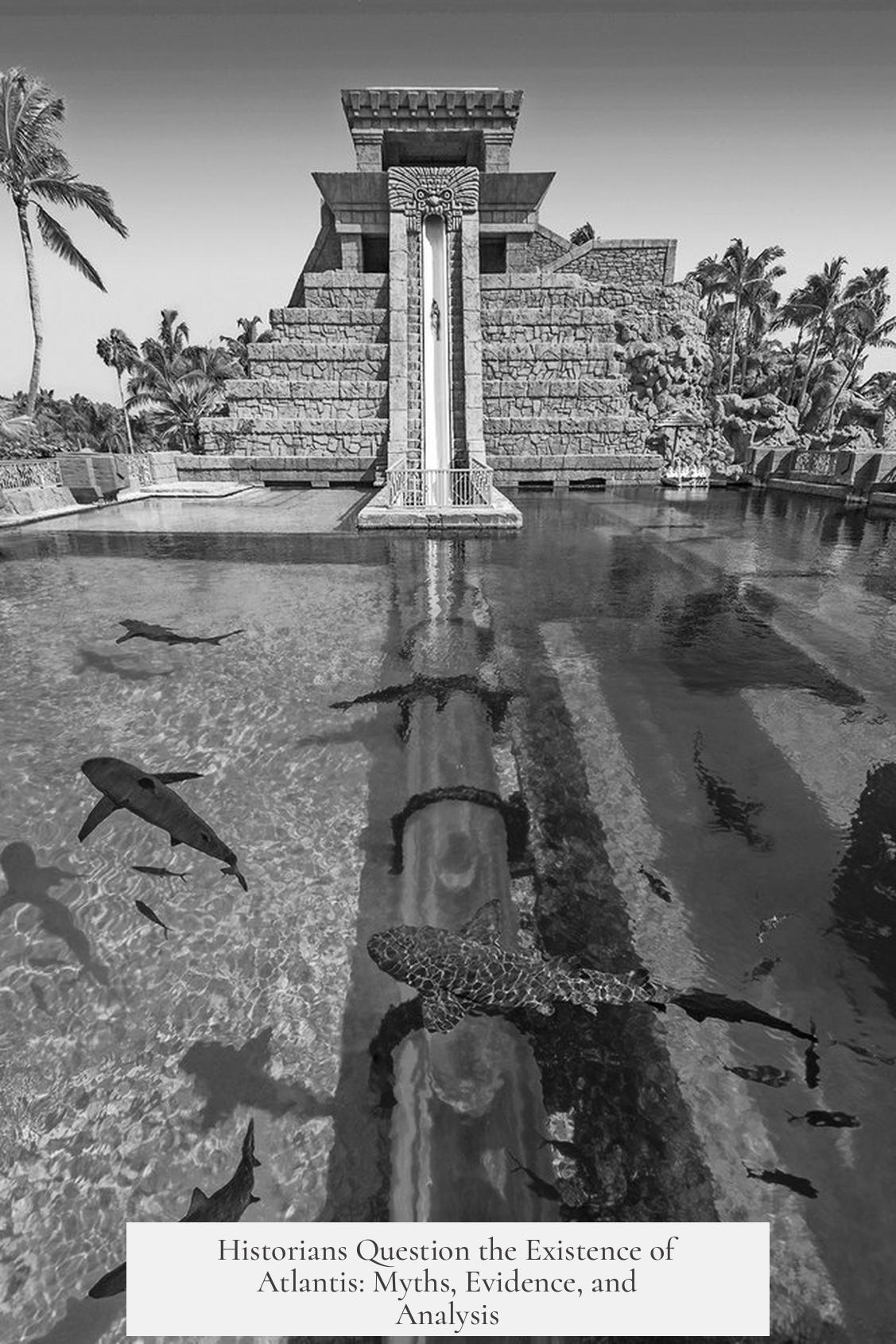Historians are confident that Atlantis never existed because the story lacks archaeological evidence, contains implausible details, and fits better as a mythological allegory than a historical fact.
First, there is no archaeological proof supporting the existence of an empire matching Plato’s detailed description of Atlantis. If such a large island nation had thrived near the Strait of Gibraltar, modern archaeology would likely have uncovered clear signs. Despite extensive exploration, no artifacts or ruins linked to Atlantis have ever been found. The absence of material evidence strongly challenges the idea that Atlantis was a real place.
The story of Atlantis originates in Plato’s dialogues, especially in Timaeus and Critias. Scholars note that Plato presents it as a tale told by one character to entertain another during a philosophical discussion. Socrates, a main figure in the dialogue, specifically asks for a story to illustrate his ideas about ideal societies. The narrative is framed as a storytelling exercise, not as a documented history.
The transmission of the Atlantis story further reduces its credibility as historical fact. Plato states that Critias’ great-grandfather heard it from Solon, a famous Athenian lawmaker. Solon allegedly obtained the account during his travels to Egypt, where priests told him about Atlantis. This chain of narration—from Egyptian priests to Solon, to Critias’ ancestor, then to Critias, and finally recorded by Plato—is indirect and convoluted. Such a transmission route invites distortion, and it raises doubts about accuracy or literal truth.
Moreover, the story serves Socrates’ philosophical aims rather than a genuine historical record. Plato’s purpose in including Atlantis is not to document a lost empire but to provoke thought on politics and morality. The story contrasts a corrupted Atlantis with an idealized Athens. It illustrates themes of hubris, virtue, and decline, aligning with Plato’s broader political commentary.
Various factual inconsistencies in Plato’s account argue against the reality of Atlantis. The timeline is problematic: the supposed war between Athens and Atlantis happens in 9,350 BCE, predating known Athenian civilization by thousands of years. Furthermore, Plato claims Athens defeated Atlantis’ massive armies alone, which seems militarily unrealistic given the city’s recorded size.
Geographical details contradict known facts. Atlantis supposedly sat just beyond the Strait of Gibraltar, spanning an area as large as Brazil. Plato describes its flooding as creating impassable muddy shallows blocking Atlantic access. Yet archaeological and oceanographic evidence shows that the strait remained navigable throughout history.
The religious elements also mismatch known cultures. Atlantis’ chief god is Poseidon, equated with an Egyptian sea deity. However, Egypt had no god of the sea, undermining the cultural accuracy of the story’s divine characterization. Additionally, the flooding narrative does not align with any single cataclysmic event described by Plato. Instead, Plato hints at long cycles of floods affecting the world, differing from later interpretations of a sudden destruction of Atlantis.
Historians also compare Atlantis to other ancient mythic cities to understand its status. Troy’s existence was debated, but unlike Atlantis, the city of Ilium was always known by historians and its site eventually confirmed by excavations. For Atlantis, no comparable historical validation has ever emerged.
Atlantis fits well as allegory and political commentary. Plato’s works commonly use allegories. The Atlantis story mirrors Athens’ resistance to Macedonian dominance, symbolizing the clash between ideal governance and imperial pride. Aristotle discusses some natural phenomena Plato mentioned but never references Atlantis, suggesting the story was not universally accepted as fact even in antiquity.
Finally, the source credibility is weak. Plato reports that the story came through a chain involving a notorious tyrant, his grandfather, and ultimately Egyptian priests—ancient equivalents of mystics with questionable historical reliability. The enthusiastic claims of truth by Critias serve to enhance the dramatic appeal rather than guarantee authenticity.
Historians highlight these points to maintain that Atlantis is a fictional myth crafted for philosophical and political purposes rather than a real ancient civilization.
| Reason | Details |
|---|---|
| Archaeological Absence | No physical evidence matching Atlantis’ description found despite thorough investigations |
| Mythological Origins | The story is a framed tale in Plato’s dialogues, passed through unreliable sources |
| Implausible Details | Timeline, military feats, geography, and religious claims conflict with facts |
| Political Allegory | Represents philosophical ideals and Athenian political commentary, not history |
| Unreliable Sources | Story stems from remote hearsay ending with Egyptian mystics; lacks factual grounding |
- No archaeological proof supports Atlantis’ existence.
- The story is a philosophical allegory, not historical record.
- Chronological and geographical details contradict reality.
- Religious and cultural claims are inconsistent with ancient facts.
- Comparison with other myths and source reliability undermines historical plausibility.
What Makes Historians So Sure That Atlantis Never Existed?
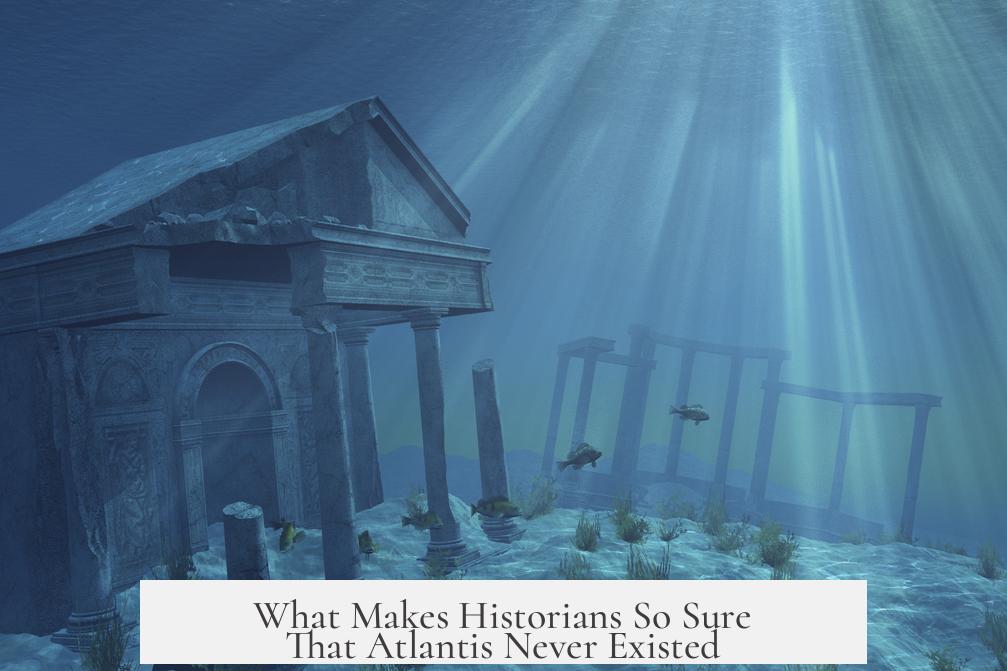
Historians are certain Atlantis never existed because there is no real archaeological evidence, the story’s details defy logic and known history, and its origins point clearly to myth rather than fact. Let’s unravel the mystery behind this legend and understand why qualified experts treat it as a fascinating tale—not a buried civilization.
Ever heard of Atlantis? That fabled island empire swallowed by the sea appears in Plato’s dialogues, mainly Timaeus and Critias. You might wonder—did such a place truly exist? Well, historians say no. And for good reasons.
The Archaeological Dead End: No Dig, No Island
Imagine if there had been a colossal empire like Plato describes. There should be ruins, artifacts, or at least some fragment of evidence left behind. Yet archaeology has nothing to offer. Lugging around shovels and picks for centuries, historians and archaeologists have found zero traces of such a vast island empire.
If an empire like the one Plato describes existed on an island like the one Plato describes, I think we’d know from archaeology.
Just as if you were to claim a lost continent the size of Brazil existed just outside the Strait of Gibraltar, underwater today—surely, some sign would remain. But the muddy shallows Plato mentioned? They don’t block ships; they’ve never done so.
Plato’s Atlantis: More Philosophical Fiction Than Ancient History
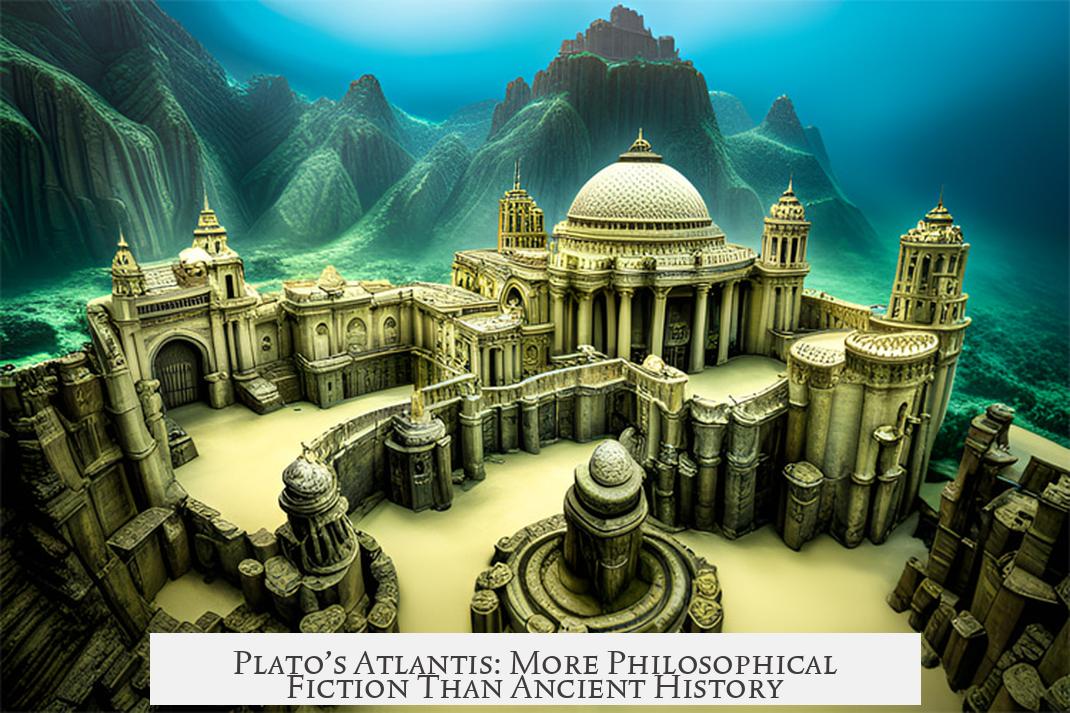
Digging deeper into the text, Atlantis first appears as a frame for a story, not history homework. The dialogue, guided by Socrates, reads like a storytelling session around a campfire rather than a history lecture.
- Socrates wants a story about an ideal city, essentially begging for entertainment.
- His friend Critias spins the Atlantis tale, sourced from his great-grandfather’s friend Solon—a Greek statesman who supposedly picked it up from Egyptian priests.
- The story’s journey from Egyptian mystics to Greek aristocrats is long and winding, making the facts highly unreliable.
The whole setup screams fictional parable designed to serve a philosophical agenda rather than document real ancient events:
Socrates wanted a good story about his ideal city, and he begged to be entertained. Critias swearing by the truth of his story adds to the excitement… Never mind the grave lack of archaeological evidence.
Those Fishy Details: Why Atlantis Doesn’t Pass the Plausibility Test
The more you scrutinize Plato’s account, the more it veers into ridiculous. Take the timeline. He claims a war between Athens and Atlantis occurred around 9,350 BCE. That’s about 8,000 years before Athens even existed historically.
Also, Plato tells us Athens, with an army roughly 10,000 men strong, defeated the vast armies of a continent-sized Atlantis—all single-handedly. Even in fantasy, that feels like a stretch.
Physical geography is another stumbling block:
- Atlantis was supposedly as big as Brazil, located just outside Gibraltar.
- The flooded shallows from its sinking reportedly make entry into the Atlantic impassable.
- But ships have always passed through that strait, unhindered in antiquity or now.
Religion also raises eyebrows. Atlantis’s patron deity is the sea god Poseidon—a Greek god name used as a stand-in for an Egyptian god of the sea. Except no such Egyptian sea god existed.
Lastly, Plato’s description of Atlantis’s demise contradicts the idea of a sudden disaster. He describes cyclical floods affecting the entire world except Egypt, rather than a single cataclysmic sinking. The popular image of Atlantis swallowed by a tsunami isn’t backed by the text.
How Atlantis Stacks Against Other Ancient Myths
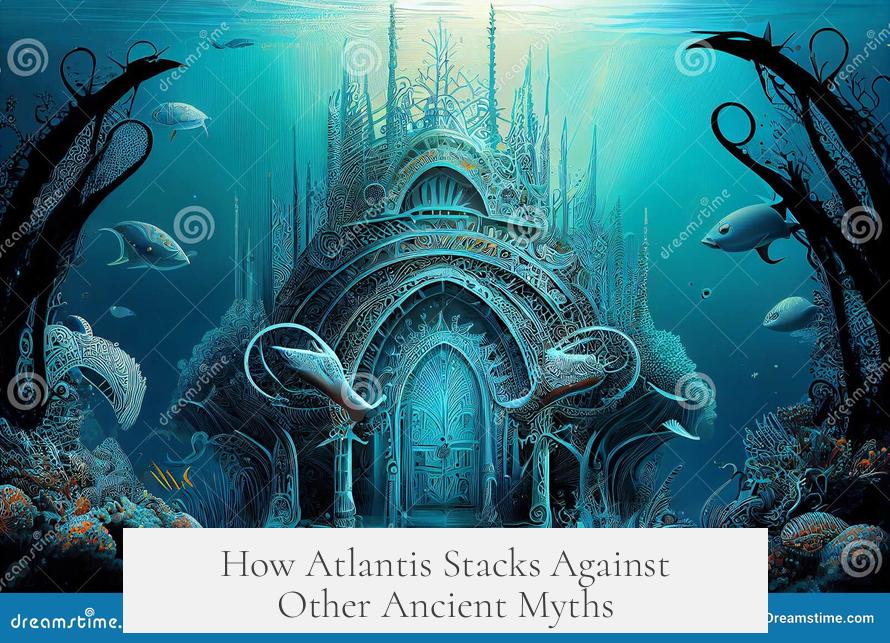
When comparing Atlantis to other legendary sites, like Troy, the difference becomes glaring.
People assumed for years Troy was mythical. But Ilium—the ancient name—was always known as a real city.
Archaeologist Heinrich Schliemann’s 19th-century dig uncovered a Bronze Age city beneath the classical ruins. Sure, scholars debated the location; they never doubted Troy’s real existence.
By contrast, Atlantis has no archaeological counterpart, no supporting written records beyond Plato, and no continuous mention in ancient literature after Aristotle.
Many scholars believe Plato’s Atlantis is an allegory tied to his political beliefs. Some interpret the story as a commentary on Athens’ strength resisting Macedonian power—painting Athens as the virtuous city crowned victorious over hubristic empires. It fits Plato’s pattern of weaving philosophical ideals into storytelling.
The Source Problem: A Dubious Lineage of Storytelling
The authenticity of Atlantis suffers from a convoluted chain of tellers:
- Critias tells the story but got it from his great-grandfather.
- His great-grandfather heard it from Solon, an Athenian statesman.
- Solon supposedly brought it from Egyptian priests or “mystics.”
To put it lightly, trusting tales handed down through several generations of “ancient equivalents” of mystics and politicians known for propaganda sounds shaky.
And let’s not forget that in Plato’s dialogue, Socrates openly seeks a good, entertaining story. That casts a shadow on how trustworthy the narrative is, beyond mere narrative excitement.
What Does All This Mean?

Historians treat Atlantis not as a lost city waiting to be found but as a compelling myth—an allegory crafted by Plato with intention. Its tale carries lessons about power, virtue, and hubris rather than archaeological facts.
Here’s a quick checklist of why historians reject Atlantis as historical fact:
- Zero archaeological evidence matching Plato’s description.
- Clearly framed as a mythological and philosophical story.
- Chronological and geographical impossibilities abound.
- Unreliable, indirect transmission of the narrative.
- Political allegory fits Plato’s context better than literal history.
- Lack of corroboration by any ancient sources or material records.
So, Should We Ever Stop Dreaming About Atlantis?
Not at all! Atlantis captures the imagination like few other legends. Whether it’s inspiring novels, movies, or debates, the story’s charm lies in mystery, not historicity.
After all, myths shape cultures by teaching, entertaining, and warning us. Atlantis might be a sunken city of fiction, but it’s an *ever-rising* symbol beneath our collective consciousness.
Next time you hear about Atlantis, ask yourself: Are you chasing a lost continent or an ancient parable wrapped in ocean-blue intrigue? Understanding why historians doubt its existence enriches the legend all the more.
